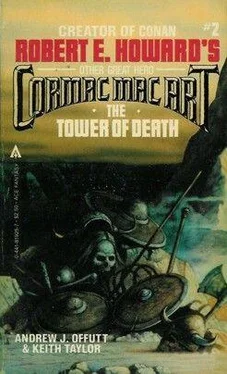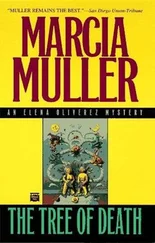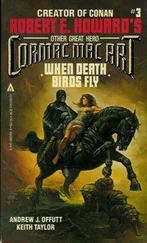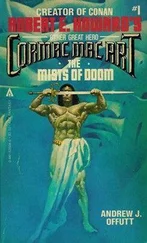Andrew Offutt - The Tower of Death
Здесь есть возможность читать онлайн «Andrew Offutt - The Tower of Death» весь текст электронной книги совершенно бесплатно (целиком полную версию без сокращений). В некоторых случаях можно слушать аудио, скачать через торрент в формате fb2 и присутствует краткое содержание. Жанр: Фэнтези, на английском языке. Описание произведения, (предисловие) а так же отзывы посетителей доступны на портале библиотеки ЛибКат.
- Название:The Tower of Death
- Автор:
- Жанр:
- Год:неизвестен
- ISBN:нет данных
- Рейтинг книги:3 / 5. Голосов: 1
-
Избранное:Добавить в избранное
- Отзывы:
-
Ваша оценка:
- 60
- 1
- 2
- 3
- 4
- 5
The Tower of Death: краткое содержание, описание и аннотация
Предлагаем к чтению аннотацию, описание, краткое содержание или предисловие (зависит от того, что написал сам автор книги «The Tower of Death»). Если вы не нашли необходимую информацию о книге — напишите в комментариях, мы постараемся отыскать её.
The Tower of Death — читать онлайн бесплатно полную книгу (весь текст) целиком
Ниже представлен текст книги, разбитый по страницам. Система сохранения места последней прочитанной страницы, позволяет с удобством читать онлайн бесплатно книгу «The Tower of Death», без необходимости каждый раз заново искать на чём Вы остановились. Поставьте закладку, и сможете в любой момент перейти на страницу, на которой закончили чтение.
Интервал:
Закладка:
Gossamer morning-mists had already begun to ravel away in the sun. Estuaries, deep and wind-swept like the northern fjords, sliced into a fertile land. Deep, blueshaded woods of beech and oak stretched broadly. Beyond loomed the greenest mist-shrouded hills Cormac had seen since he’d departed Eirrin the Emerald of the Sea.
Was said the Eirrin-born never forgot, or found true happiness elsewhere on all the ridge of the world. Homesickness took him by the throat like an enemy; homesickness roiled in his stomach. Though Raven’s deck was now the one true home he had, it was suddenly hateful to him. The land drew him like a sorcerer’s spell of summoning.
“I’ll be returning soon,” he said thickly.
“Your shield,” Wulfhere said.
Cormac slung it along his arm. With a splash and a stumble, he dropped from Raven’s thwarts. He waded forward, his eyes fixed on this land as if he were one possessed. He was vaguely aware of Clodia, who was following him close. He did not glance around. He waded ashore.
It might have been worse. At least she’d not bleated any Cormac, wait for me’s after him, for the crew to guffaw over. She was even tagging a few paces behind and keeping her mouth shut… which, had he seen his own face, would not have surprised the Gael so deep in his memories.
Then he ignored and even forgot her.
Eirrin. Love of the greater gods, Eirrin .
It’s liquid music the name was. A name that called up, that meant , the world’s bravest and fairest men and women, thick-maned horses, red and brindle cattle, rivers like molten silver with gold shining in their beds, and great shadeful forests old as time. Poets and craftsmen Eirrin produced, whose work vied with that of nature; learned men and druids of supernal wisdom and power. Splendour, and wealth, and delights. Eirrin . All barred to him.
All Eirrin barred to him. Because of the treachery of kings, and a deliberately provoked quarrel.
Cormac mac Art of Connacht had been meant to die of that provocation and ensuing duel. Instead, he had slain. Considering when and where he had done death on another Gael of Eirrin, his slaying had been well-nigh as bad as him slain, or as disastrous to the boy he’d been. He who provoked did so during the Great Fair; Cormac slew him during the High King’s peace, which was inviolate. For such a crime the laws did not award other punishment than death.
Cormac had fled away, in misery, ere he could be taken and executed. By then he knew treachery had been done on him by a rival, and by a king-and surely too the High-king himself. Crossing the plain of the sea to Dalriada in Alba up in the north of Britain, he left behind him a girl most beloved-and half his belief in the justice of kings. And too he left behind the sword of his father, for in his hand it had slain a Gael in Eirrin. The sea had it, now.
How young he’d been then, this scarred, slit-eyed pirate of Raven!
In Dalriada, he sought obscurity and low employment. In the employ of peasants, he worked the land like a peasant for nigh onto a year. Close and silent he’d been, and unknown to any he had remained. Partha he’d called himself; Partha of Ulahd, a name he had used aforetime to cloak his own.
Yet Dalriada, founded long before by Gaels of Eirrin some called Scoti , was menaced ever by Picts from the Caledonian heather. Was not a place where a born fighter could remain forever obscure. Forever? In truth, that better part of a year was remarkably long. He toiled, and one day there came a Pictish attack on his master’s lands. Heart and hand and weapon-man’s training flashed awake in the peasant labourer. He did destruction on the shock-headed dark men with a reckless ferocity even they lacked power to match, and he emerged blooded but alive-perhaps because he hardly cared whether he died. The Pictish survivors fled, a thing seldom known. Picts were wont to slay to the last, or die in like fashion.
And so distinction in combat came again upon Cormac mac Art, now Partha mac Othna. Gol, King over Dalriada, had invited him into his service, and good service had the youth given…
Good, however brief. It happened that the king’s own daughter of Dalriada took undue interest in this Partha Pictslayer, mighty and envied weapon-man who had swiftly shown himself the best among her father’s warriors. The king had eyes to see it. Now a king must and will protect his own and marry them well, and so it was arranged that Partha fell into the hands of the Picts.
For others this fate befell, the invariable result was death not long delayed. For this Partha Pictslayer-who had earned the name-the stocky, short men had plans more ornate.
They played with him right gently at first, whilst they argued the merits of all the contradictory, irreconcilable ends they wished to give him. Their prisoner even kept all limbs and members, so tender with him were his captors-though he was not left unmarked. At last they settled on slow starvation, with exposure and beatings at times.
They chose awrong. The lengthy process gave Cormac opportunity to escape. He was free again-and unwelcome in still another land. But there was the sea. From captive he became outlaw, nursed by bitterness. He gathered a band about him and took to the sea on a lifted curragh. And he came to know who had betrayed him into Pictish hands, and why.
On the wild coasts of Dalriada he left what had remained of his belief in kingly honour. His youth he left there as well, and him then not yet twenty. Nor did he meet with difficulty in making the men he led believe him older.
In vengeance and bitterness and hatred did the reiver Cormac savage the shores of Gol’s kingdom. Mothers frightened miscreant youngsters with stories of Captain Partha, Captain Wolf, the scarred raider with eyes grey and cold and glittering as the metal of his sword. Cormac an-Cliuin he was: Cormac the Wolf.
Came the time when he must quit those waters, for they had grown too scalding even for him, and his crew was quivering on the edge of mutiny. Came then a long voyage down the coasts of Britain, and Gallia and Hispania. Those Gaelic reivers had reached even Africa, where they made themselves known too well to the Vandals. Yet return to the western isles he had, lest Gol forget the man on whom he’d done a king’s treachery.
Time came when civil strife in Eirrin resulted in the sundering of Cormac’s crew. Time came when he was captured again, and tossed into prison quarters colder and more filthy than even the Picts had given him. Here he awaited execution. Another prisoner in the same plight languished there, for company. Wulfhere Hausakliufr his name, and he admired the genius of the darker man who used their meagre victuals as food for the prison’s rats, who provided nourishment for the two prisoners…
“Cormac.”
The sound of his name returned him to the immediate now. She had been saying his name for some time, to no result; he’d been deep in the past, surrounded by this Eirrin-like land. Though he eased his abstracted walking, he did not turn to look at Clodia. She spoke his name again, on a falling note, and fell silent.
The young woman behind him bit her lip. By no means was it subtly that he conveyed to her that she was unwanted! Yet she durst not return to the ship and all those men. Not without Cormac. That fearful crew of fiery-headed pirates, and those genially brazen hands of Wulfhere who was big enow to wrestle bulls for pastime!
Clodia nerved herself. Whate’er it was gnawed within this reiver made this the wrong time entirely, and not being a fool the auburn-haired girl knew it. Yet there might not be other times. Besides, she felt a touch of anger. With a ship and forty swords at his back, what had the great dark man to gloom so about?
Читать дальшеИнтервал:
Закладка:
Похожие книги на «The Tower of Death»
Представляем Вашему вниманию похожие книги на «The Tower of Death» списком для выбора. Мы отобрали схожую по названию и смыслу литературу в надежде предоставить читателям больше вариантов отыскать новые, интересные, ещё непрочитанные произведения.
Обсуждение, отзывы о книге «The Tower of Death» и просто собственные мнения читателей. Оставьте ваши комментарии, напишите, что Вы думаете о произведении, его смысле или главных героях. Укажите что конкретно понравилось, а что нет, и почему Вы так считаете.












